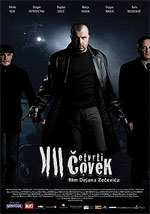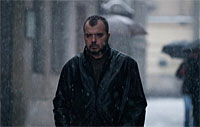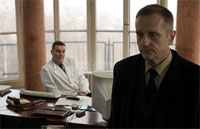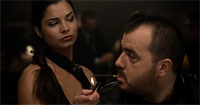 Četvrti čovjek
Četvrti čovjek
Serbia, 2007, colour, 107 mins
- Director: Dejan Zečević
- Screenplay: Dejan Zečević, Boban Jevtić
- Photography: Goran Volarević
- Editor: Marko Glušac
- Music: Nemanja Mosurović, Slobodan Negić
- Producers: Željko Mitrović, Slobodan Jocić, Dénes Szekeres, Nikolina Vučetić
- Production Company: Viktorija film
- Cast: Nikola Kojo, Bogdan Diklić, Dragan Petrović, Marija Karan, Boris Milivojević, Dragan Nikolić, Radoslav Milenković, Semka Sokolović Bertok, Feđa Stojanović, Miloš Timotijević, Miki Krstović, Dijana Marojević
A slickly efficient thriller with enough distinctive regional colour to compensate for the umpteenth revival of the hoary old amnesiac-delving-into-his-past device, The Fourth Man (not to be confused with the 1983 Paul Verhoeven opus De vierde man) maintains a pleasing amount of tension throughout, and is certainly one of the most straightforwardly enjoyable films I’ve seen at the Sarajevo Film Festival so far. Unfortunately, at least for reviewing purposes, it’s also the kind of film where the less one knows in advance, the better (and its pleasures are almost entirely narrative-based) – but I’ll try to make this as spoiler-free as possible.
 It’s certainly not giving away anything important to reveal that when Lazar Stanković wakes up in hospital from a two-month coma with a hole in his head and severe memory loss, he was targeted by unknown assassins (who also killed his wife Sonja and teenage son Miloš) in connection with his government-sponsored activities, though quite what those activities involved only becomes clear as the film progresses – let’s just say that his collection of army uniforms and weaponry and an instinctive gift for self-preservation didn’t come about from civil service pen-pushing.
It’s certainly not giving away anything important to reveal that when Lazar Stanković wakes up in hospital from a two-month coma with a hole in his head and severe memory loss, he was targeted by unknown assassins (who also killed his wife Sonja and teenage son Miloš) in connection with his government-sponsored activities, though quite what those activities involved only becomes clear as the film progresses – let’s just say that his collection of army uniforms and weaponry and an instinctive gift for self-preservation didn’t come about from civil service pen-pushing.
While still in hospital, he’s visited by two people – the colonel of his former unit (Lazar was a major), and a detective from the Military Security Agency investigating the assassination attempt. Lazar is instinctively suspicious of both of them (“Supposing you’re lying?”, he asks one, only to get the response “Supposing I’m not?”) – and also prone to brief flashes from his past, though they don’t trouble his retina long enough to leave a truly indelible impression. It also seems that he has a mistress, Teodora, and habitually drinks Jack Daniel’s, both details coming as news to him.
 One of these people then spends much of the rest of the film exploiting both Lazar’s ability to kill ruthlessly without compunction and his inability to remember his past. The title refers to the fourth intended victim of three targeted killings, the others being a businessman, a mafioso and a politician. Their various jobs fuse with the revelations about precisely what Lazar did for the Serb government, allowing director Dejan Zečević to construct a cynical thesis about the absolute corruptibility of ‘respectable’ Serbian society, and the government’s ultimate responsibility for various atrocities.
One of these people then spends much of the rest of the film exploiting both Lazar’s ability to kill ruthlessly without compunction and his inability to remember his past. The title refers to the fourth intended victim of three targeted killings, the others being a businessman, a mafioso and a politician. Their various jobs fuse with the revelations about precisely what Lazar did for the Serb government, allowing director Dejan Zečević to construct a cynical thesis about the absolute corruptibility of ‘respectable’ Serbian society, and the government’s ultimate responsibility for various atrocities.
Lazar constantly plays a game of cat-and-mouse both with his various interlocutors and mysterious third parties, including a man who always seems to be eavesdropping on his conversations or tailing him in his car or on the Belgrade metro. The city seems permanently drenched in rain, its grey skies matched by equally drab exteriors (someone has graffitied ‘ALCATRAZ’ on the side of Lazar’s apartment building). Lazar’s three targets all deny any knowledge of him, though the spectacular unpleasantness of the first two (the businessman threatens him with a “you want to sip your own balls through a straw in a glass?”, while the mafioso’s response to being shown a picture of Lazar’s dead family is to roll it up and snort cocaine through it) gives him more than enough excuse to go through with his assignment.
 However, much like a British old-school gangster from the era of the Kray twins, Lazar has real problems shooting women and children. He lets one female witness go, and it’s left to someone else to nobble her prior to her taking part in an identity parade, while a blackly comic scene involving the politician’s young son asking Lazar to refill his waterpistol provides a moment of splendidly Hitchcockian tension as the two men were trying to kill each other at the time. The politician turns out to be the most eloquent of Lazar’s intended victims, turning the conversation to religion and metaphysics before claiming that once one gets to know the human soul, one stops believing in it. Given what we eventually discover about Lazar’s past, it’s easy to see why one might feel that way.
However, much like a British old-school gangster from the era of the Kray twins, Lazar has real problems shooting women and children. He lets one female witness go, and it’s left to someone else to nobble her prior to her taking part in an identity parade, while a blackly comic scene involving the politician’s young son asking Lazar to refill his waterpistol provides a moment of splendidly Hitchcockian tension as the two men were trying to kill each other at the time. The politician turns out to be the most eloquent of Lazar’s intended victims, turning the conversation to religion and metaphysics before claiming that once one gets to know the human soul, one stops believing in it. Given what we eventually discover about Lazar’s past, it’s easy to see why one might feel that way.
And it’s here that it becomes clear that the film’s amnesia subplot offers more than merely a further variation on a long-established theme (Christopher Nolan’s Memento is probably the best recent example in the last decade). The atrocities of the various Balkan wars of the 1990s – and Lazar is reminded that he saw service in Croatia, Bosnia and indeed Rwanda – have understandably triggered a collective memory loss, with few willing to admit their culpability: not since the Nuremberg trials have so many people claimed to be merely obeying orders, even if those orders compelled them to shoot lines of unarmed Bosnian civilians in the head. Lazar’s great advantage to his puppetmaster is that he doesn’t know enough about the situation to challenge what he’s doing and even thinks that his various missions might help clarify matters – it’s only when he finally recalls the full horror of what happened to his family that he realises that he’s been a pawn in the most literal sense of the term.
Individual set-pieces are expertly handled, from the initial stalking, the evasion of security systems, the hit itself, and the equally important clean-up (with Lazar leaving an empty shell-case as a signature), and the revelatory flashbacks become increasingly explicit without ever quite giving away crucial details until Zečević is ready to do so. Though every scene forms an utterly logical part of the whole (the plot has been so carefully assembled that one can almost hear the ‘click’ as each element slides smoothly into place), it’s rarely predictable, largely because we’re never given any more information than Lazar, and have to share his bewilderment. Zečević keeps the plot twists and surprise revelations coming thick and fast, right up to the very last scene – a denouement so cynical in its implications that it made many in the audience laugh out loud. For all the darkness at its heart, the film is enormously entertaining: Zečević, like Lazar’s manipulator, is clearly thoroughly enjoying himself, and it’s easy enough to succumb to his blandishments.